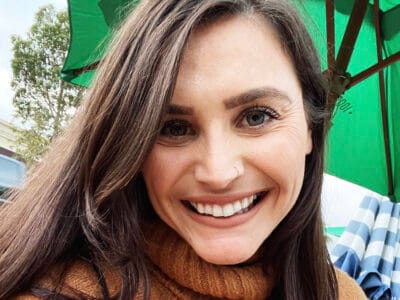The Stressed Miss
Meaghan seemed like a well-adjusted girl. But beneath it all, she suffered from crippling anxiety. Grief and loss caused it all to bubble to the surface, and finally, Meaghan realized it was time to seek help.

Story
From my earliest memories, I was nervous, on edge, or always thinking something was going to go wrong. I was scared of so many things: dogs, sirens, helicopters, not knowing where my brother or my dad were. You name it, and chances are I could find some way to be afraid of it. Despite being known as a very outgoing, bubbly person, my internal thoughts were filled with dread. Overwhelmed and consumed with the concept of uncertainty, my thoughts would run rampant. If I thought about the unknown for too long, I would become paralyzed, burdened with feelings, caught in a spiral of pure terror. I overcompensated in order to feel “normal.” But what is “normal,” really?
It was like I was waiting for something bad to happen so that when it did, I was mentally prepared.
My upbringing was pretty standard; some would even say it was fortunate. I grew up on a cul-de-sac in the suburbs of San Diego. I had friends, danced, went to church–all very middle-of-the-road. But I was consumed with unwarranted, ongoing thoughts that something bad was going to happen. It was like I was waiting for something bad to happen so that when it did, I was mentally prepared. But in truth, I was never ready for bad things to happen. I mean, who is?
Just as my earliest memories were consumed with nervousness, I have also been grappling with my desire for control for as long as I can remember. If I had control of everything around me, I wouldn’t feel anxious, right? Unfortunately, anxiety doesn’t work that way.

Throughout my life, I have always been pretty good at masking my anxiety by blending in with the status quo. To me, blending in looked like excelling at everything. I was always involved in school. I played sports, joined the student council, and wanted my teachers to know my name. I got promotions at work. I took on leadership roles. I made sure I was liked by everyone. I refused to actively rock the boat–the irony being that I stood out by trying so hard. And for what? To make other people happy?
But what about my own happiness?
When I was a freshman in high school, my cousin, whom I was very close to, passed away unexpectedly. It triggered my anxiety so badly that I could no longer hide it. For a period of time, I was not able to make it through a whole day of school without thinking I was also going to die young and suddenly. This led to many doctors’ appointments to make sure I was not actually going to die out of nowhere. It also brought on so many tears that it seemed just a matter of time before my heart would give out or explode. My anxiety would not tolerate being a well-kept secret any longer.

I am beyond blessed that my mom took me to a counselor and helped me start navigating these awful feelings. Getting diagnosed with generalized anxiety disorder and panic disorder was a godsend. The diagnosis meant that I was not alone and that I was not just making this up. Other people went through it, too.
It has been about 13 years since I was first diagnosed, and there have been some really high highs and some equally low lows. Navigating interactions in this world while also trying to heal and learn about yourself is complicated, but manageable. I have learned that being honest with myself and with others is how I can mitigate my anxiety. I know I have gotten this far because of the world I’ve sought out and created for myself.
But it is also okay for me to assert what I need in order to grow.
My support system is out of this world. I now fill my life with people who make me better, and I do the things that I want to do. People-pleasing has always been coupled with my anxiety. When others get upset with me, it usually puts me into a tailspin. I have learned that is usually because I am setting boundaries in a way that they do not like. And that is okay. But it is also okay for me to assert what I need in order to grow. I have also learned that disagreements do not mean wars are going to take place, and ultimately, being liked by everyone is not authentic or possible.
As I speak about how I have been able to transform my life, it has taken (and still takes) a lot of introspection. Two of the most important core values for me are understanding and authenticity. Growing into the person I am has not been linear, even though I have tried my hardest to make it seem that way. My imperfections allow me to help others who may be going through something similar. By living within my core values, I am able to support people in their journeys, whether they are mental health-related or not. I never wanted my mental health to be a huge component of my life. However, this is simply not the case. I often find myself talking about the importance of speaking your truth–not masking it or blending in–because we are never actually alone. With over seven billion people on this planet, it seems impossible to “feel” alone; however, our minds can tell us otherwise. This is why I speak my truth, even when it is hard and uncomfortable. In the end, I know that if I am able to get through to just one person who feels like no one else has gone through something like I have, it is worth my feelings of discomfort and vulnerability.

I believe that working on my mental health will be ongoing, and I am no longer upset about this. I used to be so angry that I was handed these cards of mental illness. I treated it like a death sentence. Even though being diagnosed was extremely helpful and relieving for me in a lot of ways, I dealt with extreme self-stigma because the diagnosis tarnished my facade of perfection.
So, inevitably, I tried to control the situation and spin it as, “Despite all these things, I’ve still got it together.” I thought working in the mental health field would heal my wounds of being diagnosed. I decided to go to school and major in psychology. I was a part of ActiveMinds, a mental health awareness club, during my undergrad studies. I was an intern at my university’s Counseling and Psychological Services, conducted research on stigma elimination with high school students, was a guest speaker for mental health-related events, oversaw and partook in a speaker’s bureau focused on mental health, conducted trainings on mental health recovery, and worked for a peer-run organization for years. I would think, “Yeah, I have issues. But others have it worse than me, and thank God that is not my story,” or, “I work in mental health, and this is me acknowledging that I have lived experience.”
I always talked about my own mental health journey as if I had everything figured out, but in reality, that was far from the truth.
I always talked about my own mental health journey as if I had everything figured out, but in reality, that was far from the truth. My conversations always felt superficial, even though I am not a surface-level person. I preached that speaking your truth is how you heal, yet I did not speak my own truth, even though my most genuine interactions with others happened when I was my most authentic self.

As I navigate the many intersections that create who I am and who I have become, I have learned that even the strongest, most noble, most “perfect” of people go through silent battles most others will never know about. So, while I still have my good and bad days, I am now equipped with various tools that can help me work through my feelings of anxiety. I have learned that one of my biggest strengths is being able to share my lived experience so others feel safe to do the same. While I come with a myriad of privileges and am able to talk openly about my mental health in an honest way with few repercussions, I hope I can continue to move the barometer in the direction of allowing everyone to be able to speak out. I hope the conversation around mental health continues to build momentum and becomes continuous, regular dialogue amongst ourselves. I am happiest when I am able to be myself. Cultivating a life in which I can do that has allowed me to increase others’ understanding that mental health is synonymous with physical health and that having mental health challenges is not something to be ashamed of.
About the contributor
Meaghan O’Brien has resided in the Bay Area since 2016. In May 2020, she completed her master’s program in education with a concentration in equity and social justice. At the time of writing, she is the Director of Peer Programs at the Mental Health Association of San Francisco.